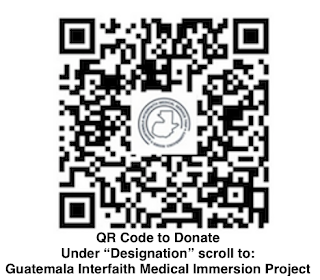Estás invitado
Estás invitado. You’re invited. It’s a comforting thing to hear. To be invited, to be included, to be a part of something worth celebrating…I am sure each one of you reading this has been invited to a special event, and there is no denying that it feels good to be wanted.
On the Friday evening that we are in Guatemala, it has become part of our interfaith team’s custom to participate in Shabbat dinner. We have two beautiful medical team members, Dr. Richard Walter and Dr. Deb Bauer, who practice Judaism, and who eloquently lead us in celebrating this special tradition on Friday evening. This year, the event was proven to be the most unique and most extraordinary that it has ever been in the many years in which we have been traveling, because it was the first year that our Shabbat dinner program booklet was written not only in English, but in Spanish for our brothers and sisters in Guatemala. Each one of us on the medical team was asked by Dr. Deb and Dr. Richard to read a part of the program aloud as we all celebrated with one another. I, and some of my other teammates, chose to read in English, and I challenged myself to speak some of my assigned part in Hebrew, while the rest of my teammates spoke in Spanish. It was an eclectic blend of languages for a tradition that is so important to our team and to this interfaith project. Shabbat dinner centers and connects us as we close out our week in clinic, and uncovers God in each one of us.
The day following the Shabbat dinner, we were all given the opportunity to reflect on the dinner as well as the clinic time that had taken place just prior to the dinner. We have reflections each night after a day at clinic, so that the students (and medical team members) are given the opportunity to consider how the work and the patient interactions has affected them. Reflections are so needed; what we experience as a team is heavy and often misunderstood by our friends and family back home. It is critical to have the time to safely share this emotional journey with people who get it. During our reflection about Shabbat, one of the students, Logan, thanked Dr. Deb and Dr. Richard for being invited to celebrate in the tradition. That got me thinking about what it means to be invited…
The patients that we saw in clinic this week have not been invited. They have been unwanted, unheard, and unseen. They have been marginalized by their government. Some of the children we saw survived attempted abortion. Some of the women had been abused and beaten by their partners. Patients with visibly physically-altering conditions looked upon with disgust. Mothers who worked at the local dump, attempting to provide for their impoverished families, were so obviously invisible. Recognizing this horrible truth that human beings have been completing stripped of any dignity felt so sickening. I immediately ached when I realized that none of these patients had ever been given the opportunity to thank someone for being thought of or for being included, because they never have been. It is total injustice, and I might have settled further into that dark feeling if I had not quickly remembered that I had just witnessed 10 young students make every attempt to rewrite the story and become the reason a patient felt invited. Every hand held, every bubble blown, every hug, every sticker handed out, every bit of real eye contact made showed our Guatemalan patients that our team saw them and loved them and so desperately wanted to give them the experience of shared humanity - many of them for the first time in their lives.
The problems in Guatemala and in the patient population we saw are not fixed. The government did not magically decide to recognize its people. But what did happen was that 10 students understood what it meant to share in the human experience and to become providers who listen, who do not discriminate, and who fight for justice. These young female students invited patients to set down their load, even if just for the 15 minutes it takes to get through the triage space, for the hour spent with the physician, or even if just for the 2 minutes spent praying together following the clinic visit. It is not easy to carry trauma alone, and if you never have a caregiver or provider who encourages you to exhale for the very first time and become an active participant in your care, you will continue to wander through life feeling unwanted, unheard, unseen, uninvited.
The amount of pride I have for these students is immense. I do not fear that they will become healthcare workers who rush through visits, never taking the time to sit down with their patients and unite in solidarity. I have witnessed the opposite; I am hopeful. I know that their future patients will be treated with dignity and respect.
So yes, as I said, it feels good to be wanted. But to be wanted and to then be TRULY seen and heard? Absolutely life-giving.
Kristen Kellogg
MSN, APRN, FNP-C
Medical Team Triage Nurse



Comments
Post a Comment